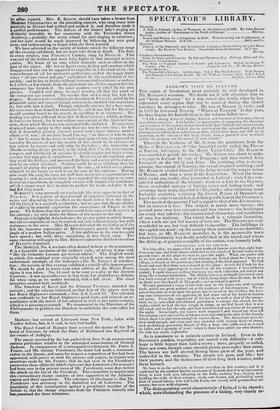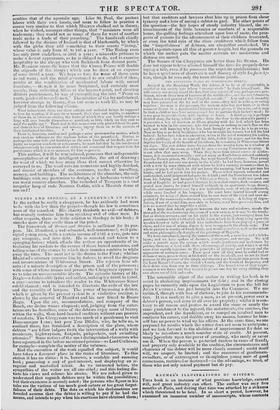BARROW'S VISIT TO ICELAND.
TIIE organ of locomotion must certainly be well developed in Mr. BARROW'S cranium. We doubt not it will stimulate him to
get " leave of absence " for a trip round the world, when he has exhausted every region that can be reached during the liberal holydays lie manages to take. He was at Moscow in 1830; and in 1833 he traversed Norway. "When at Tronyem" in that year, he thus begins his Introduction to the volume before us-
" I felt a strong desire of visiting Iceland, not however at that time, but on some future occasion. I wished for an opportunity of compariog the chameter and condition of the natives of that island with their kindred and ancient stock, the Norwegians; and I wished also to contemplate the extraordinary physical phenomena resulting from sublet railcar' fires, which have been, and still are in operation, on the surface of this huge island, from a period of time to which neither the memory nor the records of man extend."
Through the kindness of Mr. S:'.1ITIL, the purchaser, from the Duke of BUCCLEITH, of " the beautiful t atilt called the Flower of Yarrow, belonging to the Royal Yacht Club," Mr. BARROW was enabled to gratify his wishes. Mr. SMITH was about to make a voyage to Iceland by nay of Tronyem; and they started front Liverpool on the 9th of last June. On reaching, after a stormy passage, the capital of Norway, 111,3 vessel required caulking ; and Mr. BARROW availed himself of the delay to visit the copper mines of Roraas, and take a peep at the Laplanders. When the beau- tiful yacht was ready, they proceeded to Iceland ; visited tha con- stituted authorities of the capital ; went on a tour to the Geysers, those wonderful springs of boiling water and boiling mud; and retracing their steps, departed fur England,— after collecting some Icelandic statistics, receiving the Crown Prince of Denmark on board the yacht to breakfast, and dining with him at the Governor's. The merit of the present Visit is equal to that of the Excursions; but its interest is less. The subject• is much more barren ; the ground gone over less extensive and less various ; the landscapes are every way inferior ; the conventional characters and conditions of men too uniform. The island itself is a volcanic formation, where roads are not but masses of lava are. The Geysers are very wonderful to see, but very difficult to describe. The buildings in the capital are wood : up the country their material seems doubtful; but here, as Mr. BARROW describes it, is the memorable town where Christianity was finally established in the island, and where the Althing, or general assembly of the nation, was formerly held.
THINGVALLA AND ITS CHL7113:11.
Not long after, we approached a spot rendered famous more than eight buns d-ed years ago, and from thence celebrated in the annals of Iceland down to the present time: at this place we were to pass the night. When our guides told us we had arrived at the end of our journey, we looked about fir a town or a village, a church or the parsonage; but nothing of the kind appeared. We had beard and read that there was a church at this place : in vain did I look fir the steeple, the usual appendage to a chinch in all the countries I have hitherto visited ; I could discover nothing that-gave any such indication, nor indeed any thing like a human habitation. Mr. Smith, however, at length discovered sonic low roofs covered with grass ; one of which, being larger than the rest, he had no doubt was the church of Thingvalla ; and so indeed it proved. We now perceived a range of low huts near to the larger one, with verdant roofs, which our guide pointed out as the residence of the clergyman. We re- solved therefore to wait upon the priest, but lie saved us the trouble; for, hav- ing some intimation of our approach, he had come out of his house to receive our party. From the appearance of the hovels, as well as that of the incum- bent, we at once asked and obtained per mission to occupy the church for the night ; which we had the less scruple in doing, as we had heard that it was the usual, and in fact the only spot that travellers had any choice of for passing the night. Accordingly, our horses were unpacked and turned out loose till the morning ; and our saddles and boxes were deposited in the aisle of the church, where there was just room enough to receive them. The dimensions were in- deed small enough, and every part was crowded with yam ious kinds of stores, such as clothing, provisions, barrels of fish, a huge side-':addle such as is used by ladies, and a quantity of wool : when to these were added our own chattels, the aisle was nearly impassable.
As is inanimate so is animate nature in Iceland. Even in the Governor's garden, vegetables are reared with difficulty—a cab- bage is little bigger than half-a.crown ; trees, properly so called, there are none, though some stunted plants pass under that name. The horses are halt' starved during three parts of the year, and under-fed in the summer. The people are poor, and idle ; but their pastors, and the listlessness of their long dark winters, make them learned.
We have it on the authority of former travellers in this country, and it is confirmed by the resident Danish merchants of Iceland, that it is no uncommon thing to meet with men labouring in the fields, mowing hay, digging tart, building the walls of their cottages, sheds, cow-houses, and peiforming every kind of menial labour, who will write Latin, not merely with grammatical ac- curacy, but even with elegance. The distinguishing social characteristic of Icelmal is its church; which, notwithstanding the presence of a bishop, very closely re- sembles that of the apostolic age. Like St. Paul, the pastors labour with their own hands, and seem to follow in practice a course very similar to that which MILTON chalked out in theory, when he wished, amongst other things, that " ministers were all tradesmen; they would not so many of them for want of another trade make a trade of their preaching." The handicraft chiefly followed by the divines of Iceland is that of blacksmith, by which with the glebe they add something to their scanty "living," whose value is only from 61. to 101. a year. "The Bishop even has only 2000 rixdollars, or 5001. a year; a miserable pittance to make a decent appearance, as he is obliged to do, and to exercise hospitality to the clergy who visit Reikiavik from distant parts." Mr. BARROW earne4ly hopes that the Crown Prince will double the stipends of the clergy ; which can be done at an expense of some :WO/. a year. We hope so too; tirr some of them seem in sad want ; and the mind accustomed to our established ideas, revolts at the combination of mechanical labour with sacred functions,— thnugh it be more Scriptural, and certainly more seemly, than collecting tithes at the bayonet-point, and shooting dilatory parishioners, by way of exempla) ing the text " Peace on earth, good-will towards men." The mixture of the lay and clerical, however strange in theory, does not seem to work ill; as may be judged from the following climax.
What inducement, then, can these solitary and secluded beings be supposed to have for wasting, if it may he so termed, their days and nights, as numbers of them do, in laborious studies, the fruits of which they can hardly indulge a Lope will ever benefit themselves to mankind, so little likely rue they ever to meet the public eye ? Their zeal in this respect can only proceed from the pure and abstract love of litcratuie and science, urging them on to the exercise of their Mullet-mai faculties. * There is, however, another and perhaps a more praiseworthy motive, which may exert an influence on the studious habits of the priestliocd. Having to undergo the same toils and hardships as the most humble of his flock, and en- joying no superior comforts or refinements, he must feel that by his intellectual attainments only he can retain that station and command that respect from his parishioners which it is so necessary for him to possess.
This author, it will be remembered, possesses that indispensable accomplishment of the intelligent traveller, the art of drawing ; for want of which we lose many ideas that cannot otherwise be conveyed to us. The wood. cuts arc numerous and highly-finished, and consist of sketches of the costumes, merles of travelling, scenery, and buildings. The architecture of the churches, the only buildings with any pretension to design, is a barbarous version of our worst country-churches. The cathedral of Tronyem is a vast irregular heap of rude Norman Gothic, with a Moorish dome at one end !



























 Previous page
Previous page